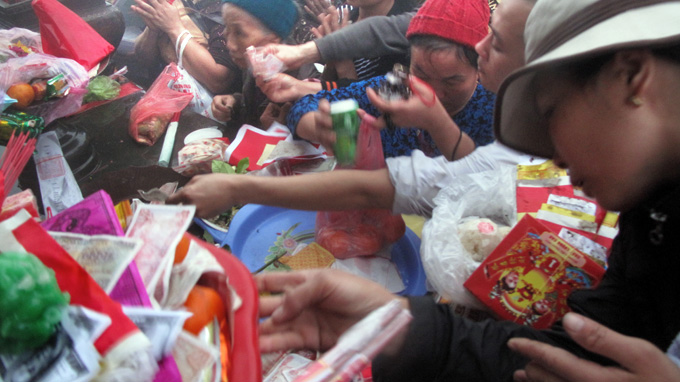Donated money, in both small denominations and generous sums, has brought about bitter, ironic consequences.
Temple head suspected of stealing donation money
Unlike in the old days, when philanthropic visitors wished to remain anonymous regarding their massive monetary contributions to pagodas and temples, many of today’s donors prefer to have their names, as well as those of their relatives, written on recognition cards or inscribed on stone slabs placed within the institutions.
Tram Be, a wealthy local tycoon, donated huge amounts to renovate seven ancient pagodas in southern Tra Vinh province, but his good deeds are marred by the omnipresence of his family’s names, pictures, statues and quotes displaying his donations in the pagodas, even near the most solemn positions.
Other unseemly incidents include ferocious fights among managers of religious institutions over profit sharing, as well as robberies and thefts occurring in the institutions, with lost assets amounting to several billion dong (VND1 billion is equivalent to US$48,077).
Many management boards offer highly lucrative services around their institutions, such as the preparing of feasts and motorbike parking.
A head monk drove his several-billion dong Mercedes car to Laos to buy lumber to renovate the age-old pagoda he’s in charge of.
The small-denominated donations which visitors scatter on altars, tree bases or thrust into statues alone amount up to several billion dong a year. The amounts donated by devout philanthropists can be considerably greater.
However, the sums the managers hand in to local governments every year remains diminutive, while the use of the rest of the money remains unknown to outsiders.
Paradoxically, the donated money intended for the institutions’ maintenance and necessary repairs changes the time-honored relics for the worse in several cases.
At several well-known pagodas and temples in northern Bac Ninh province’s Thuan Thanh district, the management uses part of the donated money to repaint the ancient statues in gaudy, modern-looking colors or make indiscriminate renovations.
One of last year’s most serious relic-damaging cases was the demolition of the quarter honoring the founding monks at the Tram Gian pagoda in Hanoi’s Chuong My commune.
With tons of money available and a lack of knowledge, the pagoda’s management simply did what they wished without concern for the consequences.
The Cui temple, which receives thousands of visitors, has at least 20 money boxes. All the boxes are run by Nguyen Sy Quynh, the temple’s manager, and his relatives, who empty the money boxes, which are filled to the brim, every few hours on festive days.
The VND420 million contract signed between Xuan Hong commune officials and Nguyen Sy Quy, Quynh’s son, in early 2011 sparked public suspicion as it lacks clarity regarding how much donated money the temple management collected and how they used it.
After the contract terminated, Nghi Xuan district set up a management board, which ran into hostile, uncooperative attitudes from Quynh and his family as they tried desperately to reclaim their ‘monopoly’ of control over, and easy access to, the donation money boxes.



















































